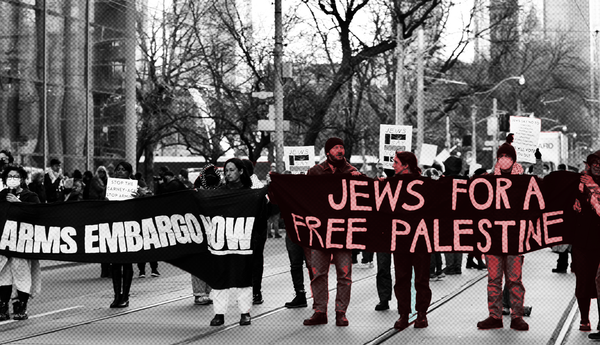Global Affairs Canada (GAC) has been ordered by a parliamentary committee to release 18 years of documents on military exports to Israel, but questions remain about whether or not the ministry will properly comply.
On February 12, the Standing Committee on Foreign Affairs and International Development (FAAE) passed a motion that ordered GAC to “produce all documents, briefing notes, memorandums and emails within the department [...] related to the granting of any export or brokering permits for military goods and technology to Israel between 2006 and 2024.”
The motion, which was first moved by NDP Foreign Affairs Critic Heather McPherson, orders that the documents be provided without redactions, “except to protect cabinet confidences and respect privacy legislation,” within 30 days.
If GAC fully complies with the order, it would provide the committee with an unprecedented amount of information about such exports, and reveal far more details than are currently disclosed through the ministry’s annual reports on military exports.
The motion followed The Maple’s revelation on February 10 that the Trudeau government authorized at least $28.5 million of new permits for military exports to Israel during the first two months of the state’s brutal war on Gaza. The ministry redacted details about the manufacturers and the exact nature of the goods being sold.
After that story broke, the issue was raised in Parliament by McPherson in questions to Foreign Affairs Minister Mélanie Joly, by NDP Leader Jagmeet Singh in a question to Prime Minister Justin Trudeau, and again by Green Party MP Mike Morrice in a question to Liberal MP Pam Damoff.
In response to the questions, ministers in the Liberal government repeated GAC statements claiming that all newly authorized military export permits for sales to Israel are for goods that are “non-lethal,” a term with no legal definition and that can refer to components of deadly weapons.
FAAE’s motion ordering GAC to disclose documents related to military exports to Israel could reveal more information about what goods have been sold. The move, which advocacy groups like Canadians for Justice and Peace in the Middle East (CJPME) have requested for years, was applauded as an important first step toward transparency.
In a statement, CJPME’s vice president Michael Bueckert said: “We are thrilled to see that Canada’s military trade with Israel will be investigated by Parliament for the first time, allowing a better assessment of the risk that these exports will be used to violate international law.”
The question is whether or not GAC will fully comply with the order, and what recourse, if any, is available should the ministry refuse or inappropriately redact important information.
Dimitri Lascaris, a lawyer who is part of a coalition that is preparing to commence litigation against the Canadian government for alleged complicity in Israel’s genocide in Gaza, said the order is good news, but noted that standing committees are not comparable to a court, meaning they cannot compel the government to hand over documents.
“If the government flouts an order of a standing committee for disclosure, it’s not automatic that the standing committee could impose a real penalty upon the officials within the government who have failed to comply,” Lascaris told The Maple.
He believes it is likely that GAC will withhold or redact some of the documents or portions of them, at which point the committee would engage in a dialogue with the ministry to understand its justification for the redactions.
The committee could then choose to accept GAC’s explanation or negotiate a compromise. Alternatively, the committee could seek an order from Parliament finding GAC in contempt of Parliament, a scenario that Lascaris thinks is highly unlikely.
“I would be astonished if they go back to Parliament and ask for an order that the Ministry of Foreign Affairs is in contempt of Parliament,” he explained. “I’d be even more astonished if they got such an order.”
“At the end of the day, the people who are going to decide what gets disclosed are the very same people who are supporting Israel.”
It is possible that GAC will simply comply with the order, Lascaris added, “but I would be surprised if there aren’t some shenanigans.”
An FAAE member with a close working relationship with GAC, Liberal MP Rob Oliphant, tried to significantly limit the scope of the requested documents while the motion was debated.
Oliphant, who also serves as Foreign Affairs Minister Mélanie Joly’s parliamentary secretary, sought two amendments to the committee motion. One, which was not adopted in the final motion, sought to “protect sensitive commercial interests” from the disclosures.
GAC commonly cites such concerns in order to broadly and sometimes inconsistently redact information about military exports.
For example, last December, GAC cited concerns about commercial sensitivity when it refused to provide information to The Maple about when it authorized a military export permit for sales to Peru. But the recent disclosures about permits for military exports to Israel all included authorization dates.
Lascaris said he found the fact that it was Oliphant who tried to push for such a broad exemption noteworthy. CBC News recently obtained a leaked recording of a February 1 conversation with a constituent in which Oliphant criticized his government’s policy on Gaza, and said he had considered quitting his job as Joly’s parliamentary secretary as a result.
“Of all the people on that committee who would ask for that broad exception, why would it be Oliphant? It just suggests to me that this guy is really engaged in some terrible doublespeak,” said Lascaris.
“When he’s actually called upon to do the right thing, he sides with Israel, because that exception undoubtedly would have been used by Global Affairs Canada to protect disclosure of information that might harm or diminish the government’s ability to support Israel.”
“[Oliphant] should have a lot of inside information about what these documents are going to show,” Lascaris added.
The Maple emailed Oliphant asking for comment on his proposed amendment, but did not receive a response by publication time. This story will be updated if a response is received.
Besides the limits that were actually added to the order, Lascaris believes GAC could also try to invoke other exemptions, such as on the basis of “national security” or information covered under solicitor-client privilege.
“It would be very surprising to me if the government in the course of approving these weapons exports didn’t get advice from the Ministry of Justice about Canada’s potential liability for sending weapons to Israel, and also about liability under international law, but also whether the issuance of these permits complied with Canada’s own domestic laws,” he explained.
Lascaris added that the question of whether or not Canada’s military exports to Israel are characterized as “non-lethal,” as is repeatedly insisted by GAC, is irrelevant.
“Anything that helps the Israeli military do its job, which is genocide, is a violation of Article One of the Genocide Convention,” he explained. “If it’s enabling the Israeli military to conduct operations in Gaza in any way, I can’t see how the government can say with a straight face that it doesn’t violate Article One, and the ICJ’s decision.”
In January, the International Court of Justice (ICJ), found that South Africa’s case accusing Israel of committing a genocide in Gaza was “plausible,” and provisionally ordered that Israel take steps to prevent acts of genocide.
Article One of the Genocide Convention states that signatory states, including Canada, confirm that “genocide, whether committed in time of peace or in time of war, is a crime under international law which they undertake to prevent and to punish.”
Rachel Small, an organizer with World Beyond War Canada (WBW), told The Maple that if Canada had a truly transparent military export control system, there would not be any need for a committee motion ordering documents. WBW has long pushed for such transparency.
“While we are pleased that this study will be happening, and we eagerly await the information that will be released — and especially details about arms exports from Canada to Israel — this is one small step towards Canada living up to the commitments it has already made,” Small explained.
Small said that if GAC fails to fully disclose all the documents ordered by the committee, it is possible that legal action against the federal government for alleged complicity in Israel’s genocide in Gaza could bring such information to light.
In late January, a coalition of groups that include Canadian Lawyers for International Human Rights and Al-Haq, a Palestinian NGO, warned the Canadian government that it would initiate legal action if the government failed to halt exports of military goods and technology to Israel.
“As part of that case, they will need to be seeing the arms permits and information about what is currently happening,” said Small.
WBW also has a whistleblower call out on its website that encourages government or military industry employees to confidentially share information about exports to Israel.
Small said that the pressure on the government from protests and grassroots movements across the country should not be underestimated.
“There is no way that Joly and Trudeau would be getting up in Parliament and saying deeply misleading statements about whether or not Canada is sending weapons to Israel if they were not feeling an enormous amount of pressure to make it appear that Canada is not arming Israel,” said Small.
“This is why they’re making up these ideas of ‘it’s just the non-lethal part of the lethal weapon.’”
Alex Cosh is the news editor of The Maple.







